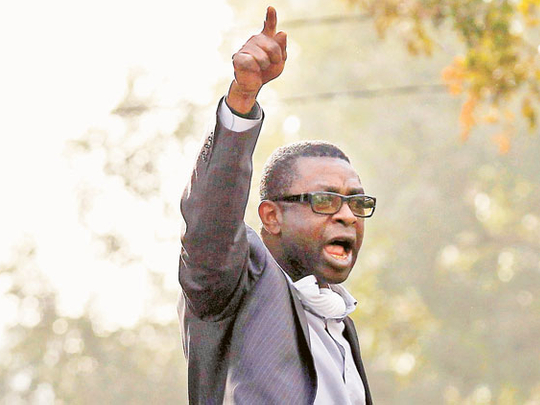
Dakar: Word of his arrival began with a whisper among a crowd eager to see their hero. Suddenly the audience surged forward, camera phones aloft, as Africa's most famous musician took the microphone. But Youssou N'Dour was not there to sing.
Instead, the multi-award winning musician, best known in the UK for his duet Seven Seconds with Neneh Cherry, had a political rallying cry for the crowd gathered in Dakar's central Place de l'Independance.
"We are allowing a dictatorship to set in here," he warned his followers ahead of the presidential election next week. "Senegal needs to free itself, to rediscover its democracy."
And Mr N'Dour, who for 40 years has captivated audiences with his music, has now set himself the task of turning his voice into a powerful political force. "I never had personal ambition to be president," N'Dour, 52, told The Sunday Telegraph. "But the situation is so bad at the moment. Senegal needs a renaissance."
However, his intentions have — for now — been thwarted by the incumbent, Abdoulaye Wade, 85, Africa's second oldest leader.
First elected in 2000, Wade is running for a third term after a court ruled that a new law restricting presidents to two terms need not apply retrospectively. The same panel of Wade-appointed judges also ruled last month that N'Dour's candidature was invalid, saying that some of the 10,000 signatures on his nomination were illegible. This has not stopped N'Dour from campaigning vociferously against Wade's "unconstitutional" third term.
And it is against this backdrop that Senegal, the only country in West Africa never to have had a coup d'etat, has become the unexpected scene of violent protest, with rocks hurled at the president's car and four killed in recent clashes.
Alain Juppe, the French foreign minister, and the US Ambassador Lewis Lukens have both called on Wade to stand aside, but he retorted that he did not care what "toubabs" (Westerners) thought.
Wade's supporters claim that he has improved infrastructure and raised living standards, while his detractors voice concerns about corruption, wasteful spending and nepotism.
Since Senegal gained independence from France in 1960 it has had a previously uninterrupted tradition of peaceful, multiparty democracy.
Tightly fought race
This time, 14 candidates are competing to be president — among them three former prime ministers, a woman who is a respected human rights professor, and a fashion designer. If none wins more than 50 per cent in the first round, the two front-runners will proceed to a second vote.
The race is tightly fought, but it seems probable that either Macky Sall or Idrissa Seck — both former prime ministers under Wade — may go through.
The main focus of opposition attention remains N'Dour, however. At Dakar's university campus, many students were sceptical about the singer's political ambitions. "He didn't even finish school, so how could he run a country?" said law student Lamine Camara, 32. "He should stick to music."
But in N'Dour's working class neighbourhood of Medina they beg to differ. The son of a impoverished car mechanic, N'Dour began singing at the age of 12, making a living trading pirate CDs. As news of his singing talent spread he gained international fame, performing with artists such as Sting and Tracy Chapman.
His 1994 recording of Seven Seconds sold 1.5 million copies. "He is a good man, and he knows our problems," said Mohammad Seck, 65, a market trader. "I trust him and I would have voted for him. We all would have, which is why it's so terrible that he has been stopped from running."
On Wednesday at an opposition rally in Medina, women in colourful headdresses berated baton-wielding riot police, until they were dispersed by volleys of tear gas.












